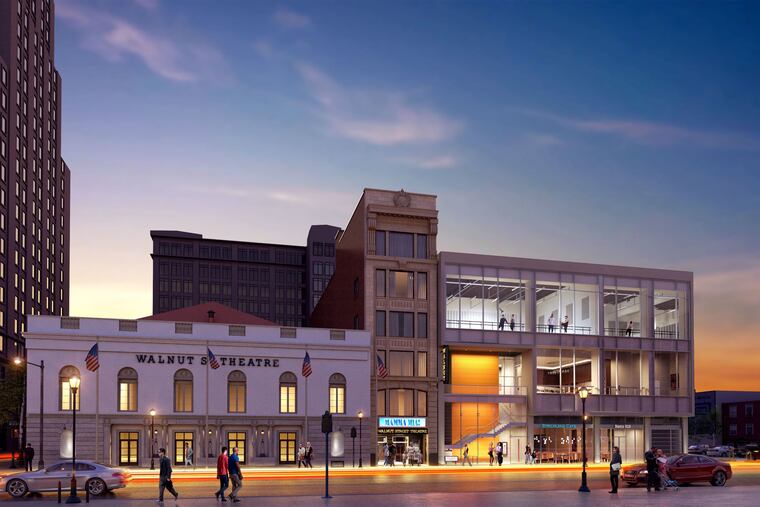Walnut Street Theatre wants to sell naming rights for $10 million, as expansion costs rise
The pandemic upstaged fund-raising to expand Philly's venerable Walnut Street Theatre. A rebooted campaign includes a pitch to donors that could mean a new name at the Center City landmark.

The Walnut Street Theatre is seeking a single donation of more than $10 million to complete a capital campaign for the long-planned, pandemic-delayed expansion of its Center City home.
The benefactor would be offered naming rights to the existing main stage, auditorium, or perhaps the entire Center City theater complex, which has long billed itself as America’s oldest playhouse. The words Walnut Street Theatre would likely be part of any new name, said Mark D. Sylvester, the Walnut’s managing director.
“The Walnut Street Theatre is a national historic landmark,” he said in an interview. “The identity is strong. But corporate or philanthropic opportunities for naming have become popular in the arts.”
In a statement, Scott Rankin, who chairs the Walnut’s board, said: “The theater ultimately belongs to the people, and so the name Walnut Street Theatre will always be present.”
The expected cost of the project has gone up to $48 million, a $9 million increase since it was announced in 2019, according to Sylvester. That estimate covers financing and construction of additional space for performances, rehearsals, classes, and restaurant operations — to be built on a portion of a surface parking lot adjacent to the box office lobby.
The new price tag reflects inflation that has driven up the cost of construction, more expensive financing costs, and an annual rise of about $1 million that was factored into projections previously.
The theater had raised about $30 million, and “we were six weeks away from breaking ground” when the pandemic erupted in March 2020, Sylvester said.
The Walnut’s president and producing artistic director, Bernard Havard, who’s now in his 40th season, has long envisioned the expansion. “It had been planned for decades, and everything was ready to go,” Sylvester said.
But then, like other performing arts organizations nationwide, the Walnut closed for more than a year as the pandemic raged. The theater reopened in 2021 with a shorter season, smaller audiences, and a subscription base that has shrunk from 45,000 to 19,000.
“The most important mission we have right now is getting audiences back in the seats,” Sylvester said.
He described opening night of Rocky, the Musical on the main stage Wednesday as “certainly one of the most exciting of my 29 seasons here ... the audience just went crazy.”
But he also said the “perception of crime in the city” is a concern for cultural organizations in Philadelphia and other cities.
“It’s something we as a community have to work together to solve,” said Sylvester, adding that the Walnut has increased its own security and is coordinating efforts with the Center City District as well as the Philadelphia police.
One new naming right is already in place at the Walnut: The proposed 400-seat theater-in-the-round, a marquee component of the expansion plan, will be called the Matt Garfield Stage in honor of the longtime city arts patron, who donated $3 million to the project.
Another Center City playhouse — once the Merriam Theater, and even before that, the Shubert — was renamed the Miller Theater last March, following the donation of an undisclosed sum by arts patron Alan B. Miller.
Michael DelBene, president and CEO of Welcome America Inc., the nonprofit that produces the Wawa Welcome America events, said naming opportunities work well as long as the donor and the recipient have a meeting of the minds.
“It’s really about saying: We are going to allow a corporation or an individual to put their name on our organization, but not let the name change who we are as an organization,” he said.
DelBene was vice president of business development at the Mann Center for the Performing Arts when ground was laid for the center’s partnership with TD Bank, and the main performance venue there was renamed the TD Pavilion at the Mann.
“An expanded Walnut Street Theatre is an expanded offering to residents of and visitors to the Philadelphia region,” he said. “It’s nothing but a positive thing.”
Sylvester said the Walnut “is about more than putting on plays” and noted that the project “will enable us to expand our educational programs.”
The theater plans to switch its school partnership program from virtual to in-person next year with the city’s Forrest, Southwark, Lea, and Ziegler elementary schools. Performances of the Walnut Street Theatre for Kids resumed in 2021.
No groundbreaking date for the expansion has been set. “This project will happen,” Sylvester said. “But we have to raise the money to finish it.”